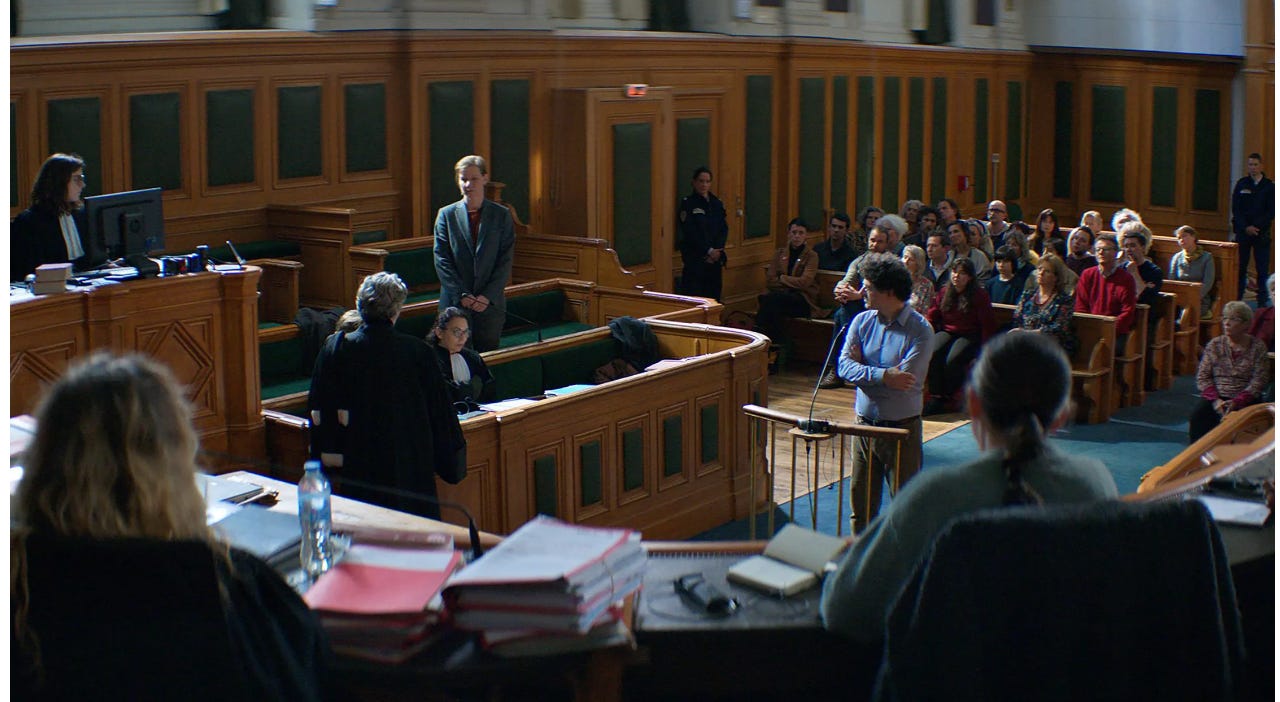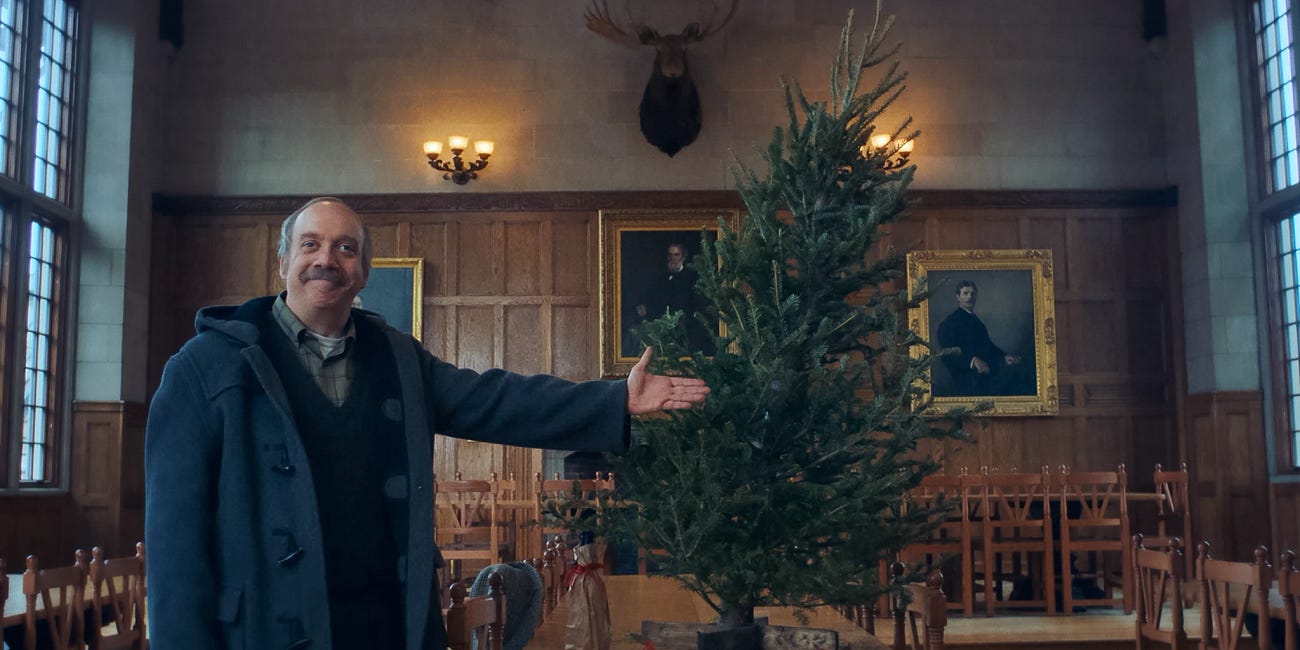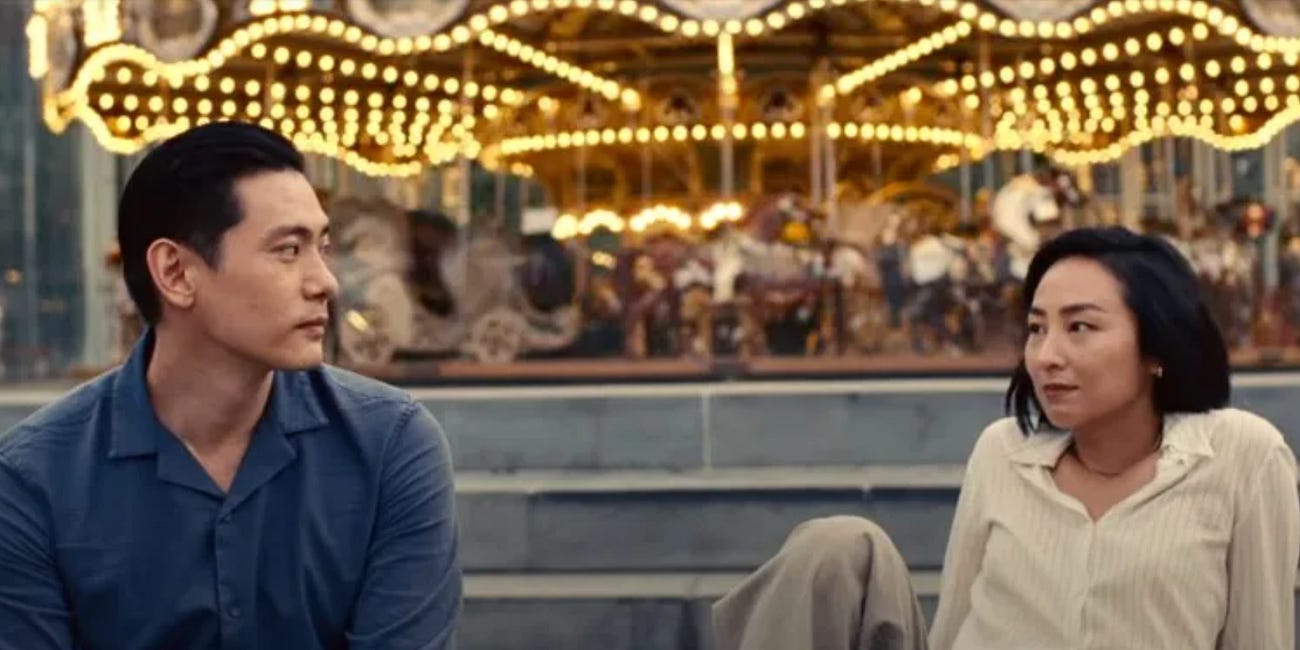"Anatomy of a Fall" Derives Its Power From Nuance
The lauded, much celebrated film and its actors' performances have made a big splash this film awards' season
“Men are afraid that women will laugh at them.
Women are afraid that men will kill them.”
- Margaret Atwood
In the French film Anatomy of a Fall (2023), available for streaming (to rent or buy) at your preferred streamer, director Justine Triet subverts traditional tropes of female and male identity. She does this via the narrative of a writer couple, Sandra and Samuel, and their visually impaired son, Daniel, living in a remote chalet near Grenoble. The event that sets off the 152 minute long film is a fall, and not just any fall, but one that results in the death of Samuel, an aspiring yet unfulfilled writer, devoted father, and unhappy husband. These are at least the cookie crumbs of Samuel’s life that the thriller drama wants us to know.
This film has won the coveted Palme d’Or (the highest honor at the Cannes Film Festival) among many other awards, including “Best Actress” awards for German film star Sandra Hüller’s (The Zone of Interest) powerful and moving performance as Sandra, a successful writer, who prioritizes her needs and interests, without heeding the familiar cultural mandates of the roles she’s cast by virtue of her born gender. The film also makes you complicit in thinking, “Yes but she is putting her needs above those of her husband and her son.” For a woman, there is an unwritten/unspoken duty to perform the roles of nurturer, carergiver, and martyr above all else. But what do we do when a woman doesn’t comply with these norms? This is the real question brimming under the surface of the film.
Anatomy of a Fall derives its power from its nuance - what it’s withholding from its audience. This form of subtlety doesn’t always play well with American audiences, who are more likely to want to see closure at the end of the film and desire more binary narratives with concrete categorizing of characters’ positive and negative qualities. In short: Everyone wants to condemn, to judge - to know with certainty if “the mother” really killed “the father,” or “the wife” murdered “the husband” in a fit of a passion, or perhaps in more calculated fashion. We salaciously want these facts, want to be able to cast off the woman and write her off. [See any Real Housewives locale and episode.] But the actual crime we are trying her for is her choice to act differently - to live in ways that men have traditionally held. And so what happens when the power dynamic inevitably shifts in respond to this?
Sandra explaining relationship nuance and shades of complexity: Sometimes a couple is kind of a chaos. And everybody is lost. No? And sometimes we fight together and sometimes we fight alone and sometimes we fight against each other, that happens, and I think it's possible that Samuel needed to see things the way you describe them, but... if- if I'd been seeing a therapist, he could stand here too and say very ugly things about Samuel. But would those things be true?
The Marriage Story
For Sandra, who is very straightforward and matter-of-fact, if not externally a little on the colder side, she makes times for writing and capitalizes on opportunity. She doesn’t understand why Samuel can’t make time. She sees his need to “talk it out” as a waste of time. In taking her son to school once a week, she asserts she’s doing her part to share in the load of parental responsibilities. Her dalliances with women are about finding intimacy, in its physical form, that Samuel won’t give her. She’s upfront about these romantic entanglements with her partner and her commitment to loving him. Both things can exist at the same time.
Meanwhile, Samuel’s depressed and has been since Daniel’s accident years ago, which he feels responsible for and which caused his impairment. We see all this revealed via a recorded argument the two had the day before Samuel’s death. In it, we also learn that Samuel was recording many conversations that Sandra and Daniel didn’t know about, perhaps for writing inspiration. What’s clear is that in addition to this being a violation of trust, this also exemplifies how any form of communication between the two has completely eroded. Samuel feels emasculated in his marriage and Sandra, frustrated, but resigned at the marital situation.
As an aside, director Justine Triet said she took inspiration in this exploration and deterioration of marriage from the 2019 film Marriage Story by Noah Baumbach.
Does “What Happened” Even Matter?
The clinical aspects of the courtroom drama where the film decidedly spends 75% of the time, is tough to watch, but also engrossing. In it, the prosecutor is grasping at any line that showcases Sandra’s “against [gender] type” behaviour even going as far as to deem her "amoral.” The courtroom tenor he creates feels more akin to the sensational court of public opinion and indictment on Sandra’s decisions as a wife and mom. Everything is under the microscope, even her books which the prosecutor claims are “art imitating reality” - so much so that at some point, you stop caring about if Sandra actually killed her husband or not, but when and how she will be emancipated from the character assassination. The proof is very circumstantial and nothing is solid there. Its the lingering question of “Could she have done it?” and the public’s perception of her that might convict her, guilty or not as her lawyer tells her.
Sandra Voyter: I did not kill him.
Maître Vincent Renzi: That's not the point.
Throughout the film, my brain was searching for answers to the initial crime, but as I sunk deeper into the story, I realized the trompe-l'œil happening - the fact that on the surface we are seeing one story but the real crime is plainly in sight if we just allow ourselves to find it. I had a similar sentiment reading I Have Some Questions For You by Rebecca Makkai. It has to do with a prep school female student who was murdered years ago and the search for the truth as to what happened to her. Of course, like any mystery buff, I was racing to know who did it and discover clues along the way, but the real meta story was the culture that fostered and allowed for a wrongful conviction to happen in the first place. That’s what we’re meant to be uncovering and focused on. Similarly in the film, Origin, based on the book “Caste: The Origins of Our Discontents”, the story opens up with the Trayvon Martin murder, but what it’s telling us is that this is the tip of an anthropological iceberg in exposing the ills of society across the world - that humans will relentlessly pursue domination (to the point of dehumanization, systemic abuse, and exterminating groups of people) in a desire to assert power over one another as a means to survival and prosperity.
The 11-Year-Old That Stole The Show, Or Movie
Inarguably the last quarter of the film belongs to Daniel, the son. Its also his testimony that weighs heavily on the outcome and verdict, in my opinion. Daniel who has been attending the trial and living out his worst attachment nightmares with having his mother accused of killing his father, clearly the more secure attachment figure of his parents, can’t come to a firm understanding if his mother is guilty. He wants to believe her, but his memories have proved shaky, at best, like anyone who has experienced a trauma. In the end, on advice from his court-appointed advocate/minder, Marge, who tells him:
“All we can do is decide. The truth is what you decide it to be.”
And so Daniel decides. He is able to make sense of the happenings by way of his connection to Snoop, his guide dog, and an event that transpired between him and his dad when Snoop was sick. It’s poignant and beautiful. Cognitive dissonance is less dissonant. All is mostly well.

Let’s Discuss - Miscellany
chimes in on his love for Halt & Catch Fire in this week’s Substack. It brought back memories for me. It’s a solid show. I don’t miss it, but I loved it at the time I watched. recommended Minding the Gap a few weeks back. I chimed in that I lived in Rockford, Illinois up until 8 or 9 (where the documentary takes place) and this is very much a story borne from its setting. The documentary is hauntingly good and delves into subjects of racism, masculinity, child abuse, and economic/social divides as told through the story of 3 skateboarders and their community. On my list to watch films nominated for Oscars, I can now check off two Sandra Hüller films and many of the flicks on the roster. I haven’t yet seen American Fiction or Killers of The Flower Moon. I couldn’t make it past ten mins into Maestro.
Oscar nominees for Best Pic I’ve Reviewed:
"The Holdovers" are Good Company
The Holdovers is playing on Peacock Grade: B (Cinematically, it’s an A+. Payne takes you back in time and to quote Rebecca Cyr, you feel like you’re watching a film from the 70s and not a film which is supposed to take place in the 70s. The story is engaging, but slow going. Giamatti’s character’s backstory reveal underwhelmed.)
❤️ "Past Lives" Presents Alternate Romantic Realities
At a time when big-budget blockbusters that say little of anything monopolize American entertainment, it pays to notice some of the smaller, more poignant cinematic fare coming out of Asia, especially South Korea. In Past Lives, a Korean-American drama directed by first-time director, Celine Song, Na Young (Greta Lee) and Hae Sung (Teo Yoo), are two 12-…
"Oppenheimer" Review: He's a Fire God and a Fall Guy
"Prometheus stole fire from the gods and gave it to man. For this, he was chained to a rock and tortured for eternity." - Opening credits of the film Oppenheimer Restraint is a hard quality to come by, as is patience, willpower and perseveran…
Top BEVP Films of 2023
It’s the yearly roundup of BEVP Film Bests, so here we go. Top 3 Films Barbie reimagined by Greta Gerwig (Lady Bird, Little Women)
Now Your Turn
Which films have you watched? Have you enjoyed? Have you found unworthy of Oscar love?
If you saw Anatomy of a Fall, what did you make of the ending? Who do you think did it? Does it matter?
Who is going to win the Super Bowl?
Can you believe people place bets on the shade of Taylor Swift’s lipstick color at the Super Bowl?












Hey Beth! This was great - I've heard of anatomy of a fall but haven't watched it yet! Will put it on my list.
Thank you so much for sharing my post with your readers :) What did you think of halt and catch fire when you watched it all those years ago?